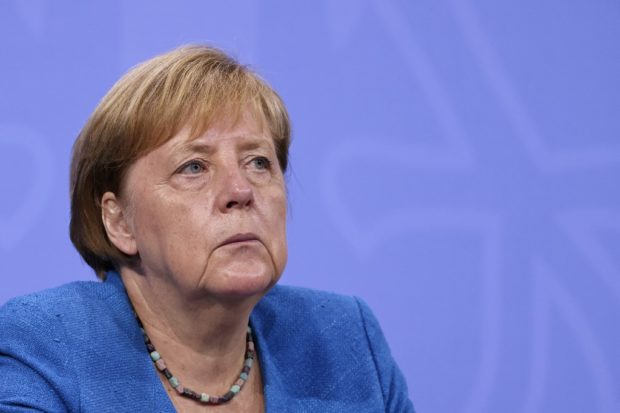
German Chancellor Angela Merkel looks on during a press conference following a meeting via video conference with the heads of government of Germany’s federal states at the Chancellery in Berlin on August 10, 2021. (Photo by CHRISTIAN MANG / POOL / AFP)
BERLIN — German Chancellor Angela Merkel will head to Moscow next Friday before visiting Ukraine two days later, her spokesman said, without giving further details on the trips.
Spokesman Steffen Seibert said details on her program and reasons for the visits will be provided next week.
Merkel’s August 20 visit to Moscow would take place just weeks before she is due to leave office following September 26 elections in Germany.
It would also be her first to the Russian capital since January 2020.
Since then relations between Germany and Russia have been highly strained by a multitude of issues, including Moscow’s troop build-up on Ukraine’s borders, a series of espionage scandals and the poisoning of Kremlin critic Alexei Navalny.
Nevertheless, Merkel had said in June that the EU should seek direct talks with President Vladimir Putin even as the bloc stands together against “provocations” from Russia.
But the call was opposed by several EU member states — especially in eastern Europe — who remain deeply wary of rewarding the Kremlin with talks before it changes course.
The last summit between EU chiefs and Putin took place in early 2014 — before Moscow annexed Crimea and pro-Russia separatists broke away from Ukraine, sparking a rumbling conflict that has so far claimed more than 13,000 lives.
Germany, France, Ukraine and Russia together comprise the so-called Normandy format, a grouping that tries to resolve the Ukraine conflict.
Berlin has been a key ally for Kiev but it has also come under fire over its support for the 10-billion-euro ($12-billion) Nord Stream 2 pipeline that is set to double Russian gas supplies to Germany, Europe’s largest economy.
Berlin argues that it needs additional gas deliveries as it phases out coal and nuclear energy.
But the project has been fiercely opposed by the United States and several European countries, which argue that it will increase energy dependence on Russia and Moscow’s geopolitical clout.
The pipeline bypasses Ukraine’s gas infrastructure, depriving the nation of badly needed transit fees and, Kiev fears, removing a key check on potential Russian aggression in the region.
Merkel, who is set to leave office later this year after 16 years in charge, has sought to emphasize to her allies that Ukraine will remain a transit route for natural gas.